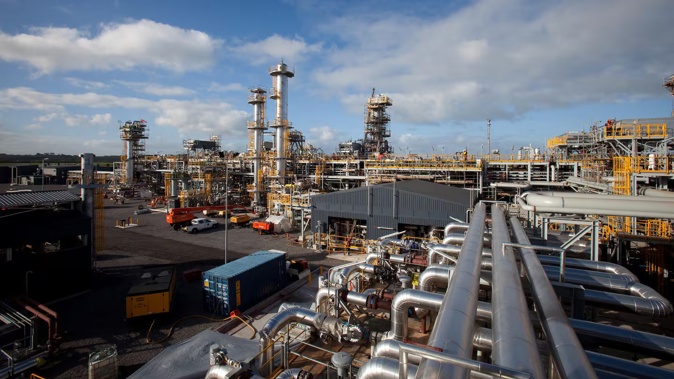
The Kupe Production Station, near Hāwera in south Taranaki. MBIE's revised forecasts have annual gas production falling below 100 petajoules by 2026.
New Zealand’s gas supply is reducing faster and sooner than previously forecast, the Ministry of Business, Innovation and Employment warns.
As of January 1, 2025, natural gas reserves have reduced 27% compared to last year, the Ministry of Business, Innovation and Employment (MBIE) said.
Karlene Tipler, MBIE’s head of data service delivery, said revised forecasts have annual gas production falling below 100 petajoules (PJ) by 2026 instead of 2029.
“In 2024 natural gas proven plus probable (2P) reserves reduced from 1300 PJ to 948 PJ,” Tipler said.
“The reduction in natural gas reserves is largely driven by field operators reducing their estimates of gas readily extractable in the ground by 234 PJ.
“The remaining reduction of 119 PJ reflects the portion of gas reserves that were used during the year.”
Resources Minister Shane Jones said New Zealand’s declining gas reserves are a stark reminder why the Government is taking action to bolster the industry and seek more investment in exploration and production.
“New Zealand needs a secure supply of affordable and reliable gas – for industry to continue and for Kiwis to keep the lights on,” Jones said.
“A 27% year-on-year decline in our natural gas reserves is further proof that the coalition Government has made the right decisions in overturning the oil and gas ban, and is willing to become a cornerstone investor in gas production.”
Jones said the Government, through Budget 2025, had committed $200 million over four years for Crown co-investment in new domestic gas field developments.
“This funding will allow the Government to take a commercial stake of up to 15% in new gas projects that feed the domestic market, helping to reduce sovereign risk and attract offshore investment.
“As well as removing the exploration ban, the Crown Minerals Amendment Bill, which comes back before the House soon, better balances the regulatory burden and risk of decommissioning and gives the regulator more flexibility in how exploration permits are issued, giving the sector confidence to get to work.”
MBIE’s Tipler said contingent natural gas reserves – or gas that exists in the ground but cannot be extracted due to current economic or technical conditions – increased by 184 PJ or 10% on last year’s figure.
“Some of this increase can be attributed to natural gas reserves being downgraded to contingent resources,” Tipler said.
“A significant contributor to this is [the] Pohokura field, which included a large volume of contingent gas which had previously not been reported.”
Natural gas delivered from gas fields also reduced 22% in 2024 compared to 2023, Tipler said.
“The greatest contributors to this were [the] Pohokura, Māui, Mangahewa and Kupe fields, who between them dropped 109 TJ/day compared to last year’s data.”
Take your Radio, Podcasts and Music with you









